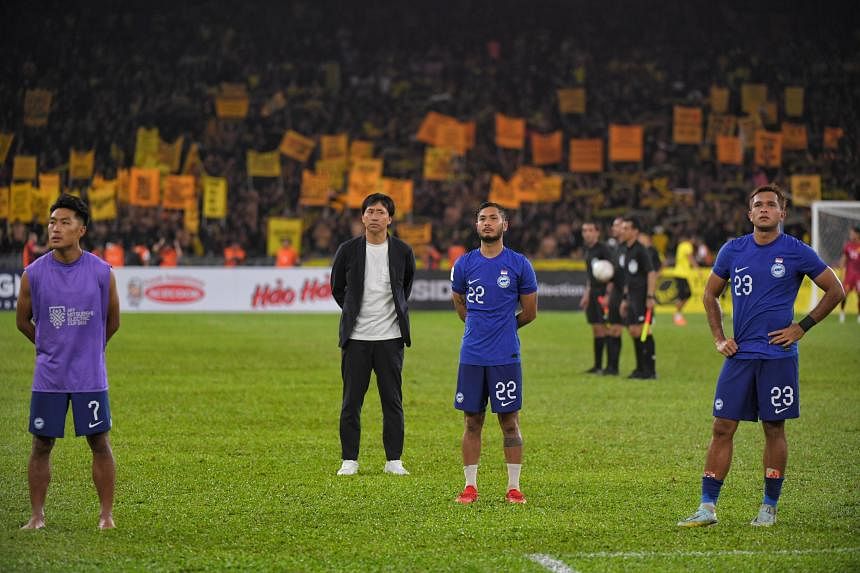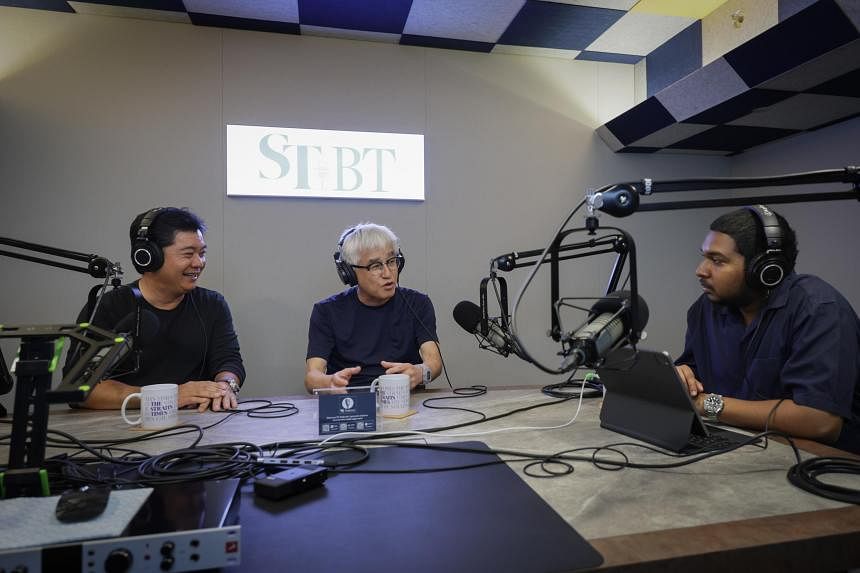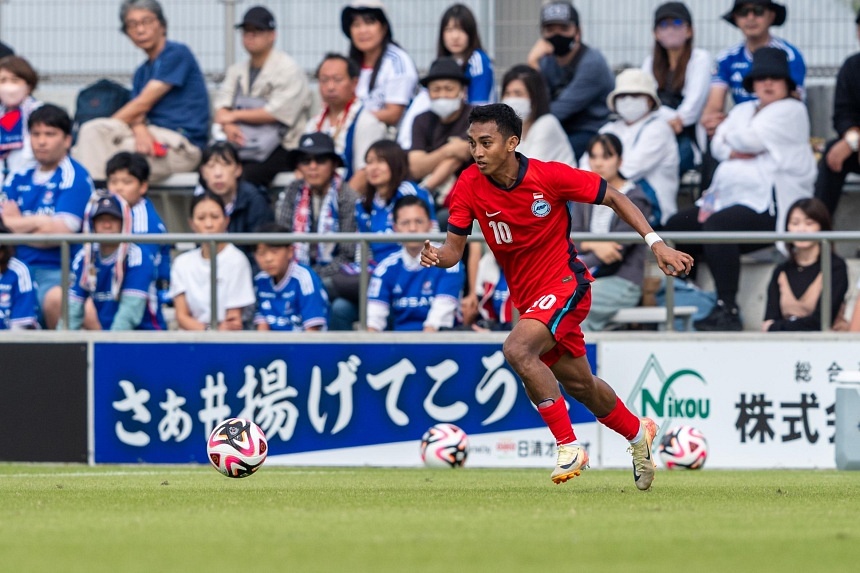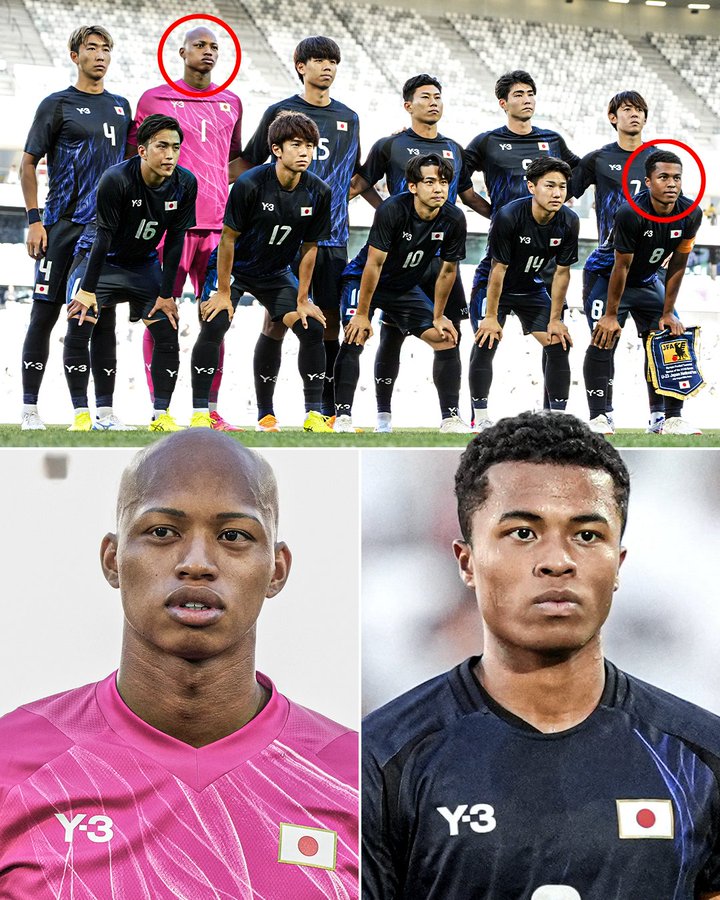Has Singapore football Unleashed the Roar to achieve its goals?
In 2021, the “Unleash The Roar!” (UTR) project was launched to transform Singapore football. The collaboration between the Government and the Football Association of Singapore (FAS) came on the back of a goal outlined by the sports body, which had set the Lions’ sights on qualifying for the 2034 World Cup.
A Singapore Youth League match at the Serangoon stadium between Junior National Development Centre (in blue) and Spanish Soccer Club Asia (white).PHOTO: UNLEASH THE ROAR
Deepanraj Ganesan
Jan 05, 2025
SINGAPORE – National skipper Hariss Harun boasts a career that is the envy of many – the 34-year-old Singaporean has over 130 international caps, a continental trophy, multiple league titles on both sides of the Causeway and an Asean Championship winner’s medal.
Yet he cannot help but wish that he had access to the opportunities now available to young footballers here.
“The amount of resources and support being put in for football now, it makes me wish I was a young player today,” he said. “In general, there is greater support from the Government, from schools, parents and the football community to pursue one’s dream of being a professional footballer.”
He was referring to Unleash the Roar! (UTR), a project launched by the Government in 2021 to improve and transform Singapore football.
Through UTR, aspiring young players get support and development opportunities through various avenues, such as overseas scholarships, the Singapore Youth League (SYL) and the School Football Academy (SFA), to set them up for success.
Impetus to unleash the roar
Once record champions in the region with four Asean titles, Singapore football has been in the doldrums in the last decade. The Lions’ Fifa ranking dipped to an all-time low of 173 in 2017 and while they are currently ranked 160th, they are behind regional rivals such as the Philippines (150), Malaysia (132), Indonesia (127), Vietnam (114) and Thailand (97).
To reinvigorate the community and raise football standards, in 2021, Minister for Culture, Community and Youth Edwin Tong announced in Parliament the launch of the UTR project.
(From left) Then Football Association of Singapore deputy president Bernard Tan, president Lim Kia Tong and Sport Singapore chief executive Lim Teck Yin unveiling details of the Unleash the Roar! project on March 9, 2021.ST PHOTO: ALPHONSUS CHERN
Mooted as a national initiative to unite Singaporeans and lift local football, the project to rebuild Singapore football has since seen the launch of four key programmes: the SFA in 2022, overseas scholarships, the Junior National Development Centre (JNDC) and National Development Centre (NDC) – which provides regular high-level training locally and overseas training camps for the best players aged between eight and 16 – in 2023 and the SYL a year later. These programmes, alongside a dedicated training facility at Kallang, underscore the investment the Government is prepared to make in football.
Hariss, who made his national team debut at 16, noted that he had limited exposure in his early footballing days. His overseas experience was confined to Asian-level school tournaments and a one-week training stint at La Masia, Spain, at 16. In contrast, promising youth players today are attached to academies in Spain and the United States for a number of years.
There was then also limited match exposure, with only 15 to 20 school games annually by age 10, compared to 30 matches yearly under the current SYL programme for kids as young as eight. Where international competition once started around 15 or 16 with just one trip a year, national youth players now travel twice annually to face teams in Europe or Asia.
Results still lacking
Over three years into the project, has Singapore football seen any progress on the pitch?
Singapore players singing the national anthem during the Asean Championship semi-final, first-leg match against Vietnam at the Jalan Besar Stadium on Dec 26, 2024. ST PHOTO: KEVIN LIM
Despite top UTR officials urging patience for the youth-centric initiatives to bear fruit, the reality is that results have not been positive across all levels.
The national team failed to win any of their six matches in the second round of qualifiers for the 2026 World Cup, conceding 24 goals and scoring just five times. While there have been bright moments such as a come-from-behind 2-2 draw against China and a semi-final berth at the 2024 Asean Championship, the Lions are not a feared force in the region.
Further down the age-group levels, the results are bleak.
At the 2023 SEA Games, the Under-22s suffered their worst defeat in the football competition since 1971 after a 7-0 drubbing by Malaysia, as they ended their campaign without a single victory.
In 2024, in continental qualifiers for age-group national teams, the Singapore U-19 and national U-17 teams combined for five losses and one victory in six matches. At the Lion City Cup last October, the Under-16s suffered two losses – 1-0 to Thailand’s BG Pathum United in the semi-finals and a 5-1 mauling by Johor Darul Takzim in the third-place play-off.
FAS president Bernard Tan explained that significant results from such an “overhaul” typically take about 10 years to bear fruit. Noting that one should not “put extraordinary weight on youth tournaments”, he added: “The underlying basis is that youth tournaments are for development. Good coaches will allow young players to play in different positions, learn how to adapt to different systems and develop mentally and technically, rather than with an overriding focus on results. It’s all about development rather than winning.”
But Sport Singapore’s chief of sport development group Marcus Tan, who oversees the UTR project, acknowledged that the results “have not been the most encouraging” and that “they must and have to be better”. He noted that discussions are being held with the FAS as they reassess teams’ approach to tournament preparations.
He highlighted the positive impact national coach Tsutomu Ogura has made to the senior team – emphasising that it is important to get the right coaches in place. ST understands that personnel changes within the coaching set-ups are being looked at.
Noting that “the current state of football is not new”, Marcus Tan said: “We have been struggling for a while and that is why we even started the UTR project. And we are not going to magically become consistently competitive overnight.
“We understand that ultimately, football is a results-oriented business. Since the inception of UTR, we have devoted the first three years towards setting up the systems, infrastructure and beefed up our coaching capabilities.
“We will take a harder look at results in the next phase to ensure that we start being more competitive at the youth level, which will translate to the senior team in years to come.”
Pointing to Singapore’s small population, low participation rate in football and land scarcity as factors impacting the sport here – as compared to its Asean neighbours – Bernard Tan added that “UTR is a monumental national effort trying to beat the odds and we are committed to try”.
Some bright sparks
At the youth level, there is a big jump in opportunities for players to pursue football at a level that “no generation of Singapore footballers have ever experienced”, said Marcus Tan.
The inaugural campaign of the Singapore Youth League kicked off on Feb 24, 2024 and ran till Dec 1.PHOTO: FAS
The inaugural season of the SYL saw about 4,000 young footballers from more than 200 teams play an average of about 30 games throughout 2024. However, there have been teething issues, such as an instance when players turned up at the venue to find it closed and lopsided scorelines during classification rounds.
In the upcoming season, the SYL numbers are set to grow to over 6,000 players from 300-plus teams. The SYL will also act as the broad base for talent identification, from which talented youth will be invited to join the JNDC and NDC.
But former professional player and coach Shasi Kumar pointed to the existing JSSL Singapore’s National Youth Leagues – which is privately operated – as a reason why he does not feel the SYL is a game changer. But he conceded that more youth players and academies being involved in regular competition only bodes well for local football.
Shasi said: “The number of players at the youth level has definitely increased, so that is good because it means there is a wider pool. But I hope the national selectors and scouts are also looking for talents from these private leagues.”
Mindset shifts among youngsters and parents are also needed for the initiatives to see results, said Marcus Tan, who added that he is heartened that top youth players now get an average of four sessions a week and a weekend match, as compared to two sessions a week previously.
He added: “We need our stakeholders, academies, coaches, parents and young footballers to realise that if we want to be among the best in Asia, we need to train like them.”
The commitment to train at a higher intensity is critical. In a sport like swimming, he added, Singapore’s excellence is a result of rigorous training – top junior swimmers train eight to 10 times weekly, while national athletes train 10 to 12 times a week.
Jury still out on scholarships
To date, 18 student-athletes – 10 girls and eight boys – have been sent on overseas scholarships under UTR with the aim of providing them with the opportunity to study, train, play and compete overseas full-time on a multi-year basis.
While the effects have been felt in the national women’s team where four of the scholarship holders played a part in helping the Lionesses qualify for the 2025 Asean Football Federation Women’s Championships, the first batch of male players – Loo Kai Sheng, 17, and Uchenna Eziakor, 16 – have yet to show promise.
Sources told ST that the ESC La Liga Centre in Madrid, where the first batch of scholarship recipients were based, has since shut and that the calibre of training and players there was also found to be “not at the required level”.
Tellingly, the latest batch of scholars were instead sent to Spanish youth side Rayo Alcobendas.
Uchenna has also made the move from the La Liga Academy to Alcobendas. Kai Sheng is back in Singapore with the Young Lions and is set to enlist for national service.
Footballers Uchenna Eziakor (left) and Chloe Koh were among eight recipients of the Unleash The Roar! overseas scholarship on July 31, 2023.ST PHOTO: CHONG JUN LIANG
Former national goalkeeper and youth coach Yakob Hashim urged UTR to also look beyond outfield players. He said: “UTR should also look at other Asian or European clubs for attachment. On top of that, while we send our outfield players, we also need to look at sending our local coaches and goalkeepers to Spain. They can learn and benefit so much from that environment.”
In 2024, former national players Noh Alam Shah and Isa Halim, who both hold Asian Football Confederation A licences, were sent to J1 League club Tokyo Verdy as the inaugural batch of participants for the Coaches Overseas Attachment programme. The pair, who have returned to Singapore, said they benefited from the stint but it remains to be seen what plans are in store for them.
Isa Halim (left) and Noh Alam Shah during their attachment with J1 League side Tokyo Verdy.PHOTO: UNLEASH THE ROAR!
Not yet a premier league
When UTR was first announced, one of the initiatives it had hoped to put in place by 2022 was the privatisation of the Singapore Premier League (SPL). More than two years on, that has not materialised. In fact, UTR has yet to attract any major corporate backing for its initiatives.
Sources have indicated that this is down to a lack of commercial interest. Attendance for matches continues to be low, with an average of 901 fans per game this season as at Sept 21.
Marcus Tan said that privatising the SPL is still on the cards, but steps are needed to ensure the clubs are ready, and that includes reshaping clubs to make each of them an attractive proposition.
He said: “While looking at SPL privatisation, we were clear that we didn’t just want a cosmetic change. And from our discussions with clubs, stakeholders and looking at the best practices overseas, the model for SPL privatisation must include clubs relooking their youth development structure, partnerships – pay attention to the whole football ecosystem and not just managing the first team.
“And to achieve that, we need more time. But we’ve already started the work, by pairing SPL clubs with youth teams (ActiveSG Football Academy teams and SFAs) and working to see how we can get SPL clubs more facilities from stadiums to training facilities.
“This has taken longer than expected but we are hopeful we can do it in the next year or two.”
Taufik Suparno (left) of Tampines Rovers celebrates with teammates after scoring the fourth equalising goal against Geylang International in the Singapore Premier League match held at Jalan Besar Stadium on May 17, 2024.ST PHOTO: MARK CHEONG
Welcoming the move, Geylang International head coach Noor Ali said: “What this can do is create an identity from young and give every player a clear pathway. From the time he enters school at an SFA to the point he reaches the SPL, the pathway becomes clear. There is also a sense of belonging and then clubs can tap on the schools and the kids’ parents as supporters.”
Shasi also urged the authorities to improve the intensity of the SPL, noting that the gap between the league and the international game is too wide, adding that it is crucial for talented footballers to get opportunities abroad.
Is the World Cup still a goal?
Seeing the Lions play at the sport’s biggest stage in nine years’ time seems increasingly like a pipe dream, as observers say meeting this target is almost impossible, given the current circumstances.
Even achieving former Sport Singapore chief executive Lim Teck Yin’s earlier goal of winning the SEA Games gold by 2027 or 2029 looks a long shot.
Singapore’s best result at the Games remains silver medals in 1983, 1985 and 1989. The Young Lions last made the semi-finals in 2013.
Former national footballer R. Sasikumar said setting lofty goals was essential in any project and that it was too early to pass judgment on UTR.
“When you set a goal, it needs to be lofty. But at the same time, when you create lofty goals, people tend to throw cold water and they will use words like ‘be realistic’. But the reality is that goals cannot be mediocre,” said Sasikumar.
“If we want to say the ultimate goal is to win SEA Games gold, then all our actions will be in line with that. Then Asean competitions will become our World Cup. For the sake of our football, we must aim a lot higher.”
Admitting that Singapore are “very far” from achieving the 2034 goal, he said a better gauge will be where the national team are five years from now.
Being competitive in Asia would be a better target, said Shasi.
Calling the UTR initiative a “very ambitious project”, he added: “Let’s look at the little milestones. We should aim to reach the Asian Cup first. That is the real goal and a sign of progression.”
Noting that the 2034 World Cup is an “aspirational target”, Marcus Tan added: “We hope to do well in the 2027 SEA Games and especially the 2029 edition, when we host it on home soil. It will not be without its challenges. But we will give it our best.”
On whether UTR is on track, he is certain about one measure of progress.
Reflecting on Hariss’ remark, he said: “It is safe to say that Singapore football is in a better place now. The UTR journey has just begun, and we will need time in order to do more and lift standards to where we want them to be.”
Despite the numerous challenges, when asked to rate UTR’s success so far, Bernard Tan gave it a “10 out of 10”, citing “the fact that we have a UTR programme, and it is off the ground”.
He added: “Singapore football is better for it, and this is recognised by many in the ecosystem. Is it perfect? It’s not, and we knew when we started that it should not be the case... Better put things in motion and make adjustments rather than wait till things are perfect before acting.
“We are doing things never done before in Singapore’s football history. So we are going to have missteps. If we are so afraid, we will not move.”


























